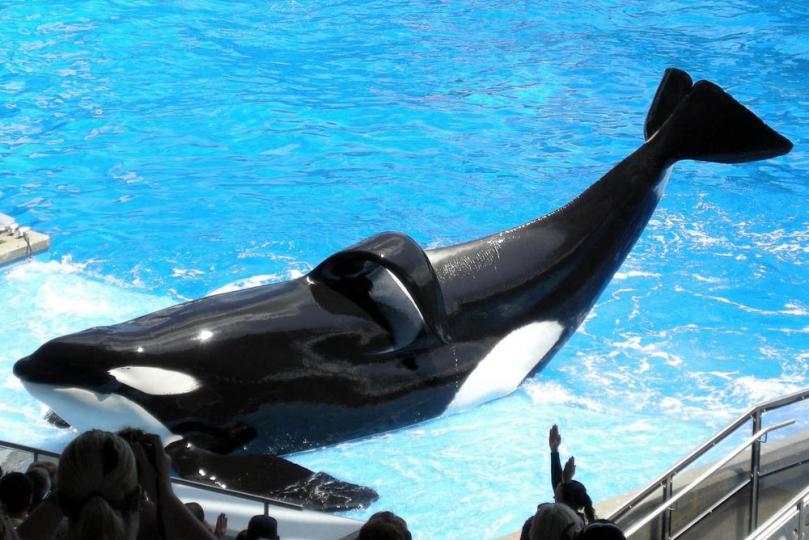Why I oppose everything that SeaWorld stands for

Seaworld has attracted significant controversy due to its treatment of Orca Whales, partially thanks to the recent documentary, “Blackfish.” Photo Credit: http://cdn.ph.upi.com/
By Andrew Monthey, Opinions Editor
This past week I had the chance to watch CNN’s “Blackfish.” The documentary focuses on the life of an Orca whale, named Tilikum, who was captured off the coast of Washington in the 1980s. Tilikum is responsible for the deaths of three trainers ever since he was captured. The film alleges that the psychology of Orca whales in captivity changes and they become irritable, frustrated, and even angry. This in turn leads them to lash out, grabbing trainers by the foot, or even mutilating them.
SeaWorld, of course, contested the facts of the filmmakers. Various SeaWorld executives and spokespeople have denied the allegations and have alleged that the film is in cahoots with “extremist animal rights groups.” Yet the reach of “Blackfish” is no longer limited to a small proportion of people. Millions of people have seen “Blackfish” and have raised concerns, leading one California lawmaker to propose a bill which would ban the captivity of Orca whales in California.
My own opinion is that SeaWorld is a corporate organization that no longer serves its supposed purpose. The company has claimed constantly that it is promoting “welfare” and preserving “interest” in marine animals and their conservation. SeaWorld has in effect created a myth about themselves as a conservationist organization. Yet how can they deny that their practices are ultimately going to harm the animals in captivity?
The film alleges that Sea-World keeps their Orca whales in small swimming-pool sized boxes when they are not performing. The whales often fight with each other, leading to injuries, especially noticeable scarring and bleeding. Yet they are kept for human entertainment. Additionally, by killing three trainers, it seems obvious that these creatures are not playing around. How can SeaWorld deny that these animals get irritable, especially when their injuries are obvious and their anger has led to three unnecessary and unfortunate deaths?
The problem of greed is destroying both human and Orca lives. Orca whales normally travel large distances in the wild with their families. Orca offspring stay with their parents forever, forming strong kinship ties. But what Sea- World does not understand is just how strong this kin bond is for them. When Tilikum was first captured, he was separated from his mother. This would ultimately cause terror for him and his family. The film also notes that Orca whales have highly developed and complex emotional intelligence similar to that of humans. Those who keep Orca whales in captivity are committing emotional abuse to these animals.
Yet SeaWorld and its treatment of animals also tells us something about us and how we perceive ourselves as part of this world. There is a longstanding view that the world has been designed for human control, and thereby for human use. Certainly no one would deny that humans have essentially “taken over” the planet as we know it. Yet it leaves many open questions about what the world means to us as human beings. Does it serve our ends or does it serve its own ends? This struggle is not an easily resolvable one.
Yet our actions in this world will ultimately be judged by our posterity. We, as humans and members of the planet, have a responsibility to our children and their children—that is, to give them the same opportunities as has been given to us. Yet we must accept the relinquishment of the archaic ideology that the earth is designed for humans and only humans.
As part of this relinquishment we must strive to understand the moral trajectory of civilization. Rather than appealing to an age-old moral universe, it seems more likely that the path of our societies and communities should be determined as a path in which morality changes. One of these changes, which must be widely considered, is to end the unfair treatment of animals by humans for sport and entertainment (or any other reason for that matter).
So what do I make of this? SeaWorld is a despicable organization. Whether you are an animal rights activist or simply a layperson who opposes animal abuse, there is no denying that this degradation of such marvelous creatures should no longer continue. The California lawmaker is brave in taking a strong stance on this issue, and I do hope that his mission does not become limited to the west coast but spreads throughout the country.
